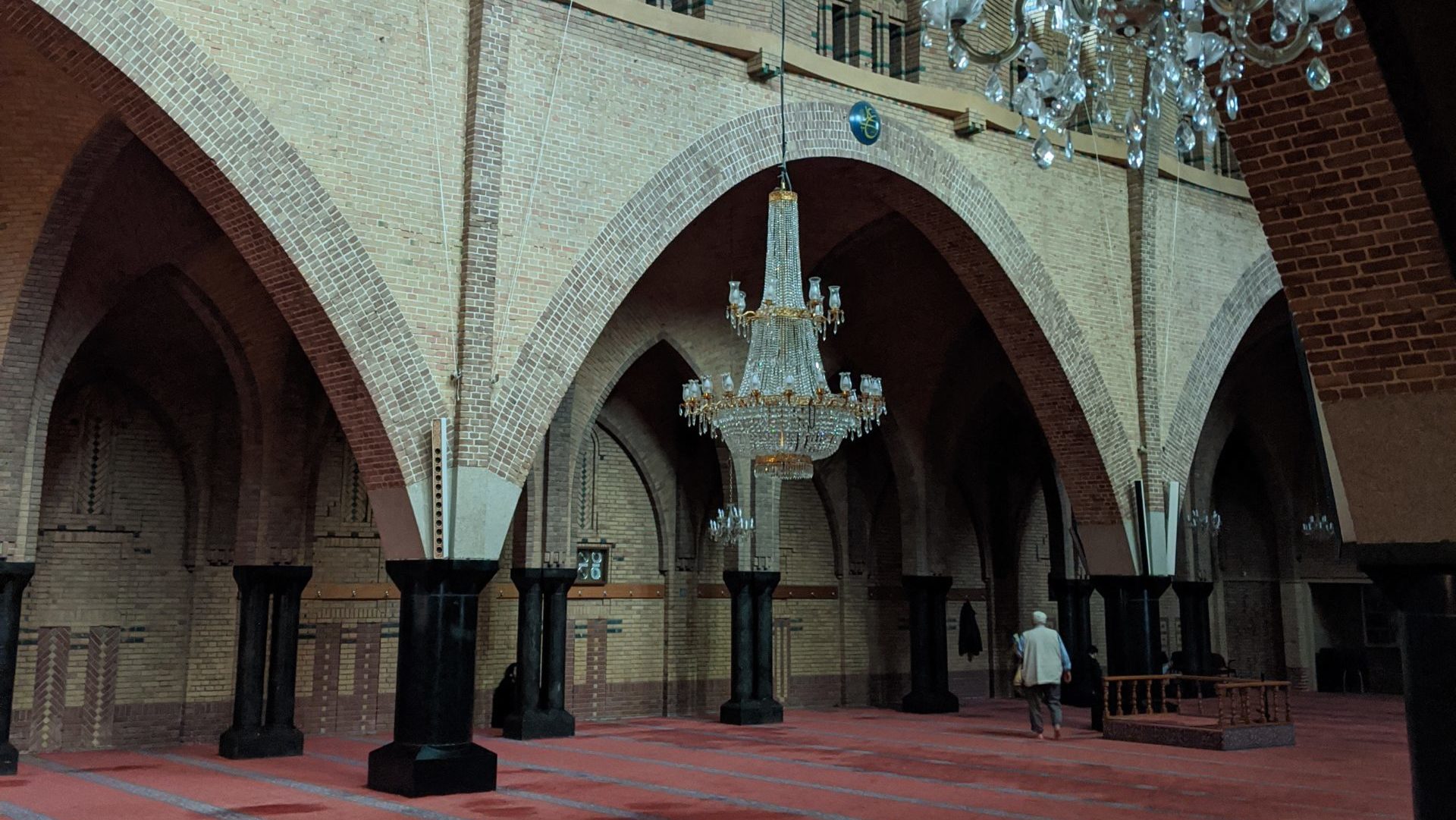The prophetic axiom of cleanliness (or rather, purity) being half of faith is never more apparent than when I walk from the cold and rain of a European street into the unblemished, carpeted warmth of a mosque. In Amsterdam, I walked past the relaxed back-and-forth between Somali and Moroccan uncles, hung up my coat in the washing area and practiced broken Arabic with an uncle who might have been speaking Darija. He told me about an attack somewhere, after asking me where I was from; he lamented our global condition and we both prayed for better; the contours of our conversations are the same everywhere it seems.
In the beautiful main hall of this former church on the Rozengracht, the grand Catholic arches surround a shimmering Muslim chandelier that hangs low in the middle of the room above my beloved carpet. The exposed brick of the wall one would face to pray was adorned with large cubic Kufic script with God’s name. It was quiet and dim, the grey Dutch sky too dark to illuminate the vast space, though I didn’t want anyone to turn on the lights. I felt held by the room, grateful for it, in awe of its size and impressed by the deft flourishes that imparted its Islamic identity. I prayed the traveller’s prayer and took in what I could in the short time I had. I wanted to bottle the silence—the respite from the incessant rain, from the incessant outside. I could have slept in the quiet but had to leave. When I returned for sunset there were a few more present: a Turkish man making a video for a either a news channel or travel show with his young accomplice, walking around the place like a tour guide. When I left I returned to the bakery next door where a kind woman had watched my laptop and the rest of my luggage while I prayed. Then back to meet the rain again, to the airport, to another grey capital.
I’ve always preferred mosques when they were emptier. Wherever I travel, I find a mosque—somewhere that sounds and feels like a home, no matter how different the congregation is to what I’m used to, no matter the lingua franca. In an empty mosque one can walk around more freely; I can feel the warm carpet under my feet, touch the beads—rotate from one to another, open the Quran and see how well I can read the script—check what I still know by heart. The radiators are free to sit near and imbibe the warmth. Hear the quiet incantation of the uncle in the corner, hear my own breath in prostration. There is a clarity found in those rooms hard to find anywhere else, small pockets of faith and lightness. A one-on-one lesson away from the harmless noise of children’s classes, an immigration law clinic in the basement between the struggling student and a veteran jurist, an exhausted labourer napping before returning to his obligations, a focused elder hoovering the carpet while his grandson tweets about Islam at home.
As beautiful as they are, I’ve rarely visited a church or cathedral in which I didn’t think how impossible it would be to sleep on the floor. It’s common to walk into any mosque, especially between prayer times, and see an old man asleep in the corner, awaiting the next call to rise and stand. This is true of grand mosques, small makeshift ones and airport prayer rooms—so different from the pews and the stone of European churches and cathedrals.
I sat next to a bearded, shalwar kameez-ed elder at the departure gate at the airport. He was awaiting the plane for Leeds, I for London. We had Mirpur in common, and luckily its tongue too. He talked to me of drug dealers in Bradford and I playfully downplayed his claims to goad him into telling me more. Mirpuri storytelling and humour is a joy I wish more could experience; no translation of his crack about how kids could afford supercars could do it justice. His demeanour was calm, as if he’d made this trip many times before, one leg crossed over the other with only the thin white cotton to protect his old legs from the chill. I had been away for a few days, running from one place to another, so speaking to someone who talked so quietly, with a dash of homely mischief, was the perfect antidote to my restlessness. It was as if my blood had calmed, and I was sorry I didn’t have more time with him.
We are told to move through the world like a traveller, that the expanse of the earth is ours to prostrate on. But not all movement is as simply undertaken as mine, shielded by a red biometric passport, manhood and a destination where loved ones await. Some patches of the same earth are charred, others wet with blood, others entirely forbidden, protected by barbed wire no poem or story can clear away. In all our chaos, I find a guilty peace in warm, empty mosques and the white beards of strangers.





